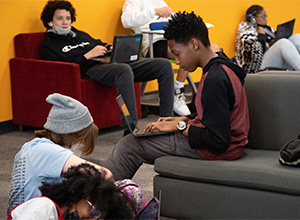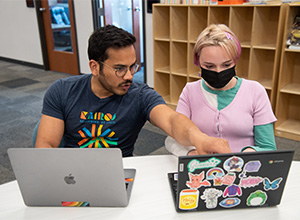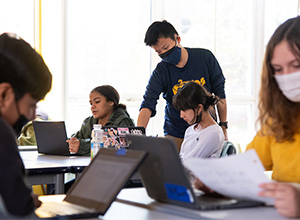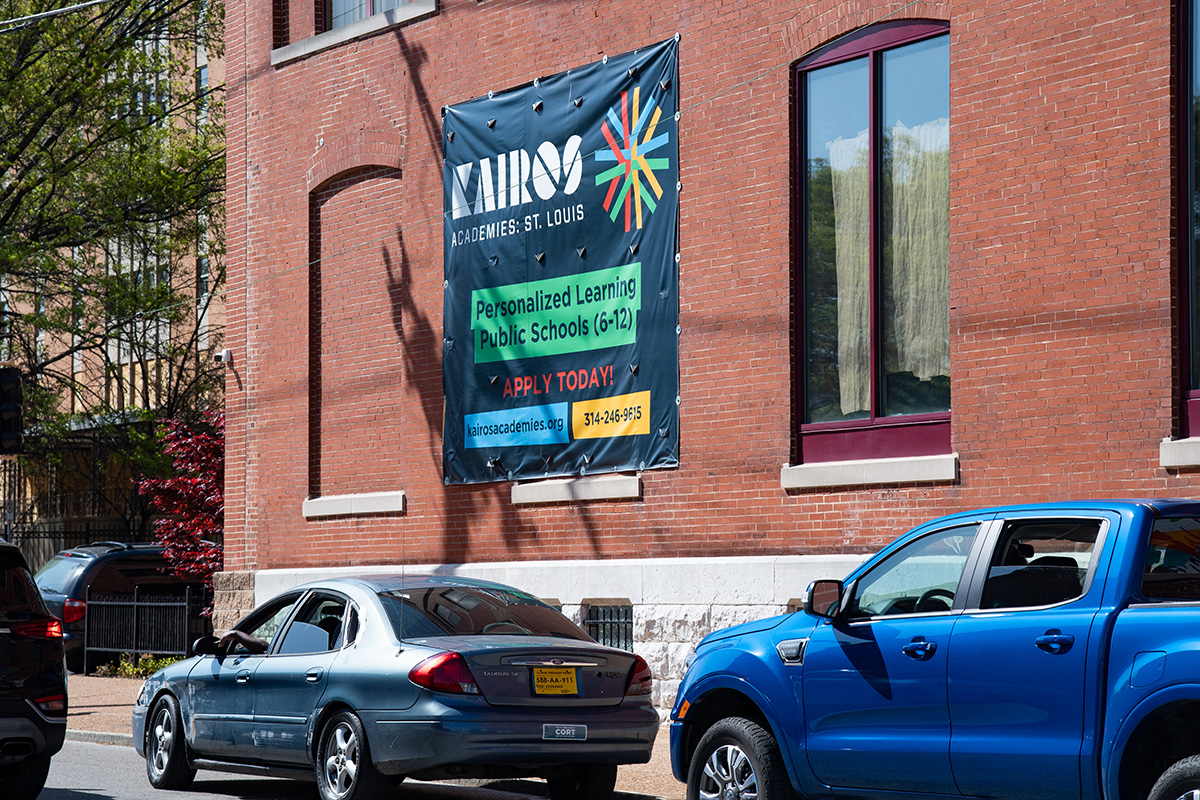At the beginning of the school year, Alexa Rojas persuaded her parents to enroll her at Kairos Academies, the charter public school a block from her home whose education philosophy was different from anyplace else in the city.
The project-based learning and academic coaching intrigued her. Now with most of her eighth grade year complete, Alexa is looking forward to the school’s personalized learning approach as a high schooler, and the freedoms and responsibilities that will come with it.
“I’m so glad I’ll get to continue here,” said Alexa, in a small room off the library. “The way we learn here – it helps me a lot.”

Eighth graders work independently during their afternoon choice period.
In August, Kairos Academies High School will open its doors inside the same Dutchtown printing facility that holds its middle school. The expansion will add one grade level a year starting with ninth grade, and provide a high-quality option in a city where open-enrollment high schools have struggled academically for more than 50 years.
Since the opening of Kairos in 2018, students at the middle school have demonstrated growth on the NWEA assessment that consistently exceeds the national average. During the school’s first year, student growth exceeded the national average by 1.5 times in math, two times in language, and 2.7 times in reading. During the pandemic, growth slowed, but continues to outpace the national average by about double.
“That’s growth we’re really proud of,” said Jack Krewson, co-founder. He is counting on this growth to continue at the high school level.
Addressing the quality shortage

Nilesh Patel, left, works with an eighth grade student during a coaching session.
St. Louis has an abundance of public high schools, but very few that offer a quality education. Of the 21 public charter and district high schools in the city, just three have English or math scores that exceeded the state average in 2021, according to the Missouri Assessment Program. Those three are selective district magnet schools that only accept students who meet and maintain rigorous academic criteria.
In contrast, Kairos High School will be open enrollment. Like the middle school, it will be diverse by design. The goal is that no one racial group exceeds 50% of the student body. Students come from a range of household incomes. About 65% qualify for free or reduced-price lunches.
The Opportunity Trust invested in the incubation and launch of Kairos Academies in 2018, and has provided the school with ongoing support through leadership training and financial contributions. Nilesh Patel, who will lead the high school launch, is a fellow in the Entrepreneur-In-Residence program.
The school’s strategy is to mimic a college or professional environment as much as possible. Its personalized learning approach provides students with the ability to direct their own schedules but with the support of executive functioning coaches who serve as academic guides and stick with students through middle and high school.

Li Mellon, standing, works with students in a sixth grade math class.
Each student receives the amount of structure needed to maintain academic progress. Once students demonstrate they can achieve their goals with a high level of support, they earn more autonomy and less structure. The goal is to replicate the type and depth of choices they will confront in college and the real world.
The twice-weekly coaching sessions begin with goal setting, including assignments and work that must be completed that week. The midweek check in is to determine the student’s progress and to address anything that might be getting in the way of meeting their goals that week.
“Eventually kids start to set their own goals and they manage their own time, Krewson said.
Only model of its kind
The high school will take this personalized model and kick it up a notch. In addition to academic advising, coaches will serve as college counselors. They will help students identify their strengths, motivators, talents and long-term goals and match them with different careers. The goal is to help students envision themselves in various careers and then begin exploring them.
By graduation, students will have completed paid internships and received college credit and/or trade certifications. The model will be the only one of its kind in the St. Louis region.
The school will also ensure students will also have traditional high school experiences, such as proms and pep rallies – experiences that were particularly important to parents, Nilesh said.
Many of Kairos’s other draws are experiences not found anywhere else.
“We’re upending the way traditional education works,” Patel said. “Giving so much autonomy to students lets them leave with a fundamental understanding of who they are. Very few schools focus on the whole aspect of the child. I don’t see it happening anywhere else in the country.”
The high school will enroll about 140 students per grade level. Middle school enrollment is approximately 400 students.
Makiah Williams, 14, is excited to transition to the high school with her classmates. She recalled her first day at Kairos – remembering the amazement at getting her own Chromebook, when she was accustomed to worksheets, and getting more control over how she spent her time.
Makiah has since developed a strong bond with her academic coach. Makiah is quick to point out that her coach is her favorite adult at the school.
“She’s given me a lot of confidence,” Makiah said.
Makiah has all A’s and particularly enjoys math. She’s interested in learning more about real estate and careers that fall under the category of first responder.
“I’m excited about going to high school here,” she said. “Everything about it is preparing me for college.”
